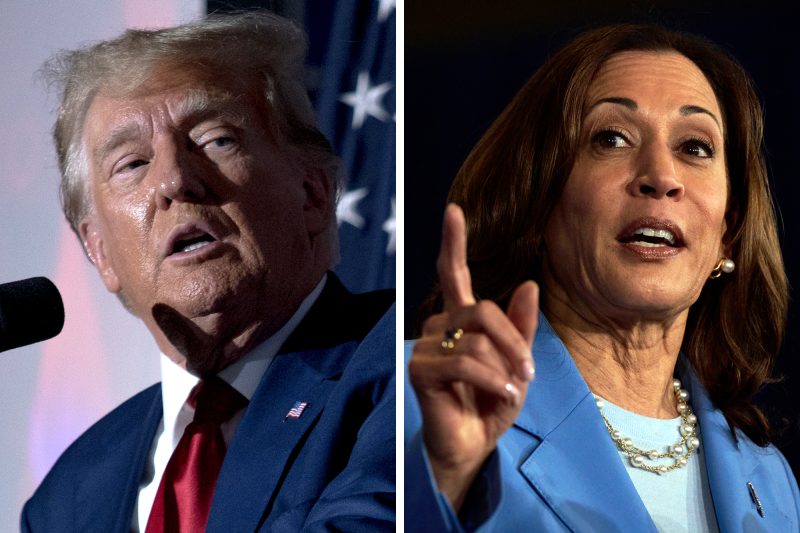Donald Trump and Vice President Harris are both set to court Black voters on Wednesday as Democrats hope their new candidate can re-energize their most reliable constituency and prevent the GOP from making gains.
Republicans have been keen to improve their performance with Black voters and especially Black men, encouraged by polls that showed softening support for President Biden. But they could face a stiffer challenge now that Biden has bowed out of the 2024 race, paving the way for Harris — who is Black and Indian American — to lead the Democratic ticket.
Trump’s itinerary on Wednesday reflects his continued hopes to chip away at Democrats’ traditional dominance with Black Americans. But it also underscores the resistance he is facing. He plans to sit for a Q&A midday at the National Association of Black Journalists convention in Chicago — an arrangement that immediately drew backlash from some members and that one former White House correspondent called a “slap in the face.”
Trump is also holding a rally Wednesday night in Harrisburg, Pa.
Harris, meanwhile, is expected to speak in Houston on Wednesday evening to a gathering of the sorority Sigma Gamma Rho — the latest in her extensive outreach to members of historically Black sororities and fraternities that make up the “Divine Nine.” Harris spoke to her own sorority, Alpha Kappa Alpha, in July and addressed another group, Zeta Phi Beta, last week.
Democratic operatives say Harris’s candidacy already shows signs of motivating Black voters — whose flagging enthusiasm for Biden had left a hole in the Democratic base. One CNN survey found that Black voters who previously split 70 percent for Biden and 23 percent for Trump backed Harris by a wider margin of 78 percent to Trump’s 15 percent. Other polling shows less of a shift.
Republicans are betting that a so-called “Harris Honeymoon” will fade and are pumping tens of millions into ads attacking Harris.
Trump’s campaign said that in Chicago he will discuss “the most pressing issues facing the Black community” in a conversation moderated by Harris Faulkner from Fox News, Kadia Goba from Semafor and Rachel Scott from ABC News.
The former president has angered Black Americans in recent years with some racist and inflammatory comments and his promotion of false attacks. “What the hell do you have to lose?” he said when he ran in 2016, portraying Black communities as riddled with crime and poverty. Trump has also promoted a false conspiracy theory questioning the citizenship of Harris and has repeatedly mispronounced Harris’s first name, a move some critics have derided as demeaning.
Trump raised his political profile falsely claiming America’s first Black president was born in Africa; lamented immigration from “shithole counties”; and in 2019 told four congresswomen who are racial minorities to “go back” to the places they came from. Three of the lawmakers were born in the United States.
Trump’s team has made a point to hold Black outreach events, even as his rally crowds skew heavily White. In recent months Trump has campaigned at a Black church in Detroit and rallied in the South Bronx, where he touted his economic record and said his policies would protect voters of color from crime. A pro-Trump super PAC, MAGA Inc., has run some ads targeted to Black voters that hit the Biden administration on high inflation, undocumented immigration and transgender athletes’ participation in women’s sports.
Trump has also suggested that Black voters like him more because of his criminal cases. “I’m being indicted for you, the Black population,” Trump said this February at a gala for the Black Conservative Federation.
Democrats, meanwhile, have promoted record-low Black unemployment during the Biden administration — and tried to communicate how their policies are helping Black voters who have often expressed cynicism about both parties. They have also accused Republicans of broadly trying to take the country backward.
“Across our nation, we are witnessing a full-on assault on hard-fought, hard-won freedoms and rights,” Harris told members of Zeta Phi Beta last week. She listed — among other concerns — “the freedom to live without fear of bigotry and hate” and “the freedom to learn and acknowledge our true and full history.”
Scott Clement contributed to this report.

